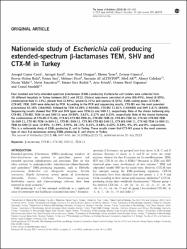Nationwide study of Escherichia coli producing extended-spectrum beta-lactamases TEM, SHV and CTX-M in Turkey

Göster/
Erişim
info:eu-repo/semantics/openAccessTarih
2013Yazar
Çiçek, Ayşegül ÇopurSaral, Ayşegül
Düzgün, Azer Özad
Yaşar, Ekrem
Çizmeci, Zeynep
Balcı, Pervin Özlem
Sarı, Fatma
Fırat, Mehmet
Altıntop, Yasemin Ay
Ak, Sibel
Çalışkan, Ahmet
Yıldız, Nazan
Sancaktar, Metin
Budak, Emine Esra
Ertürk, Ayşe
Özgüm, Osman Birol
Sandallı, Cemal
Üst veri
Tüm öğe kaydını gösterKünye
Çiçek, AC., Saral, A., Düzgün, AO., Yaşar, E., Çizmeci, Z., Balcı, PO. ve diğerleri. (2013). Nationwide study of Escherichia coli producing extended-spectrum beta-lactamases TEM, SHV and CTX-M in Turkey. Journal of Antibiotics, 66(11), 647-650.Özet
Four hundred and forty extended-spectrum beta-lactamase (ESBL)-producing Escherichia coli isolates were collected from 10 different hospitals in Turkey between 2011 and 2012. Clinical specimens consisted of urine (80.45%), blood (6.59%), cerebrospinal fluid (1.13%), pleural fluid (2.95%), wound (4.31%) and sputum (4.54%). ESBL-coding genes (CTX-M1, CTX-M2, TEM, SHV) were detected by PCR. According to the PCR and sequencing results, CTX-M1 was the most prevalent beta-lactamase 83.18% (366/440), followed by TEM 44.09% (194/440), CTX-M2 31.81% (140/440) and SHV 1.81% (8/440). Sequencing results showed that TEM and SHV types were TEM-1b and SHV-11, respectively. Rate of the strains harboring only CTX-M1, CTX-M2,TEM-1b and SHV-11 were 30.90%, 3.63%, 2.27% and 0.23%, respectively. Rate of the strains harboring the combinations of CTX-M1-CTX-M2, CTX-M1-CTX-M2-TEM-1b, CTX-M2-TEM-1b, CTX-M1-TEM-1b, CTX-M1-CTX-M2-TEM-1b-SHV-11, CTX-M1-TEM-1b-SHV-11, CTX-M1-SHV-11, CTX-M1-CTX-M2-SHV-11, CTX-M2-SHV-11, CTX-M2-TEM-1b-SHV-11, TEM-1b-SHV-11 were 12.95%, 11.59%, 2.95%, 26.13%, 0.45%, 0.68%, 0.22%, 0.22%, 0%, 0% and 0%, respectively. This is a nationwide study of ESBL-producing E. coli in Turkey. These results shows that CTX-M1 group is the most common type of class A beta-lactamases among ESBL-producing E. coli strains in Turkey.

















